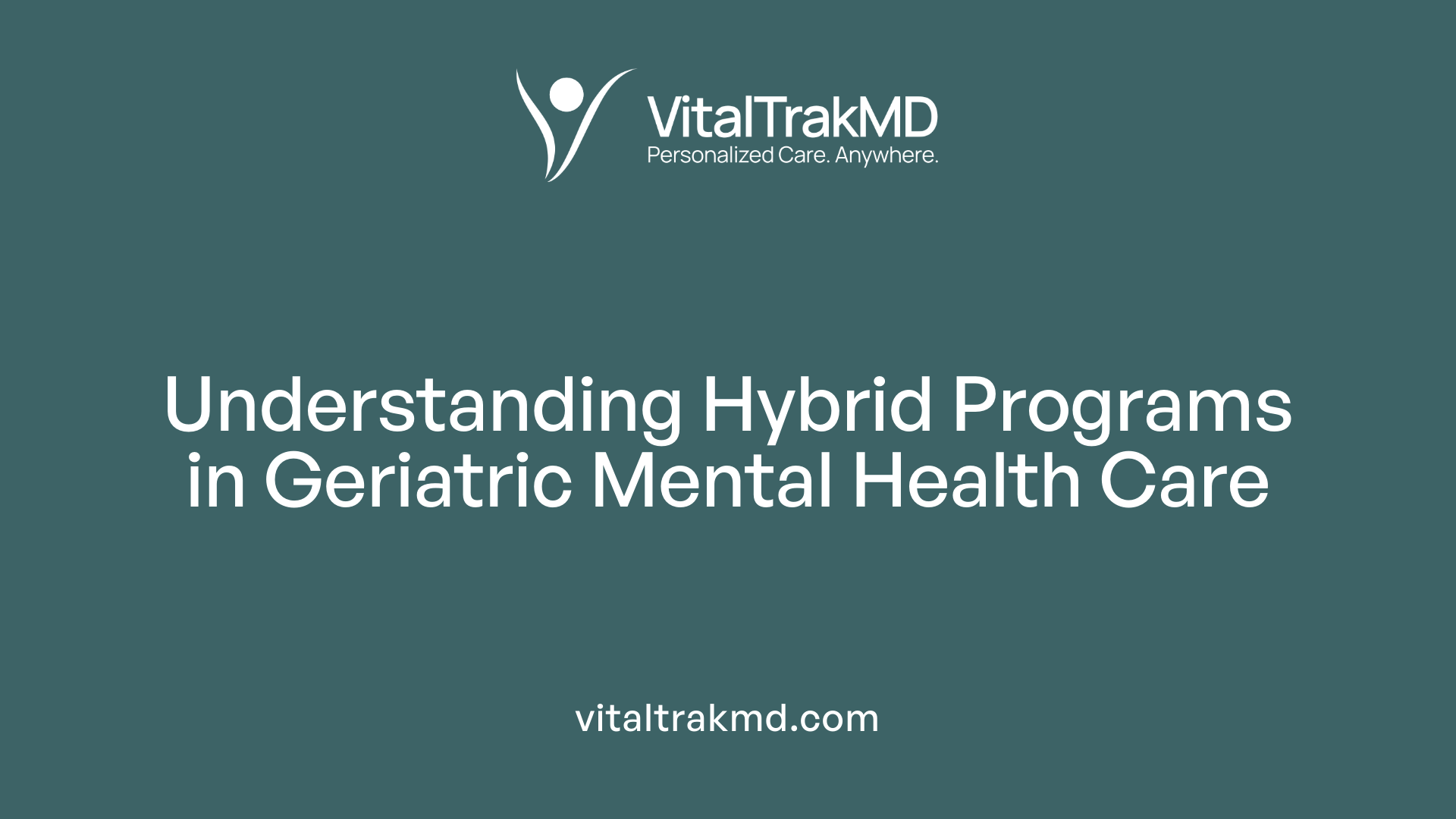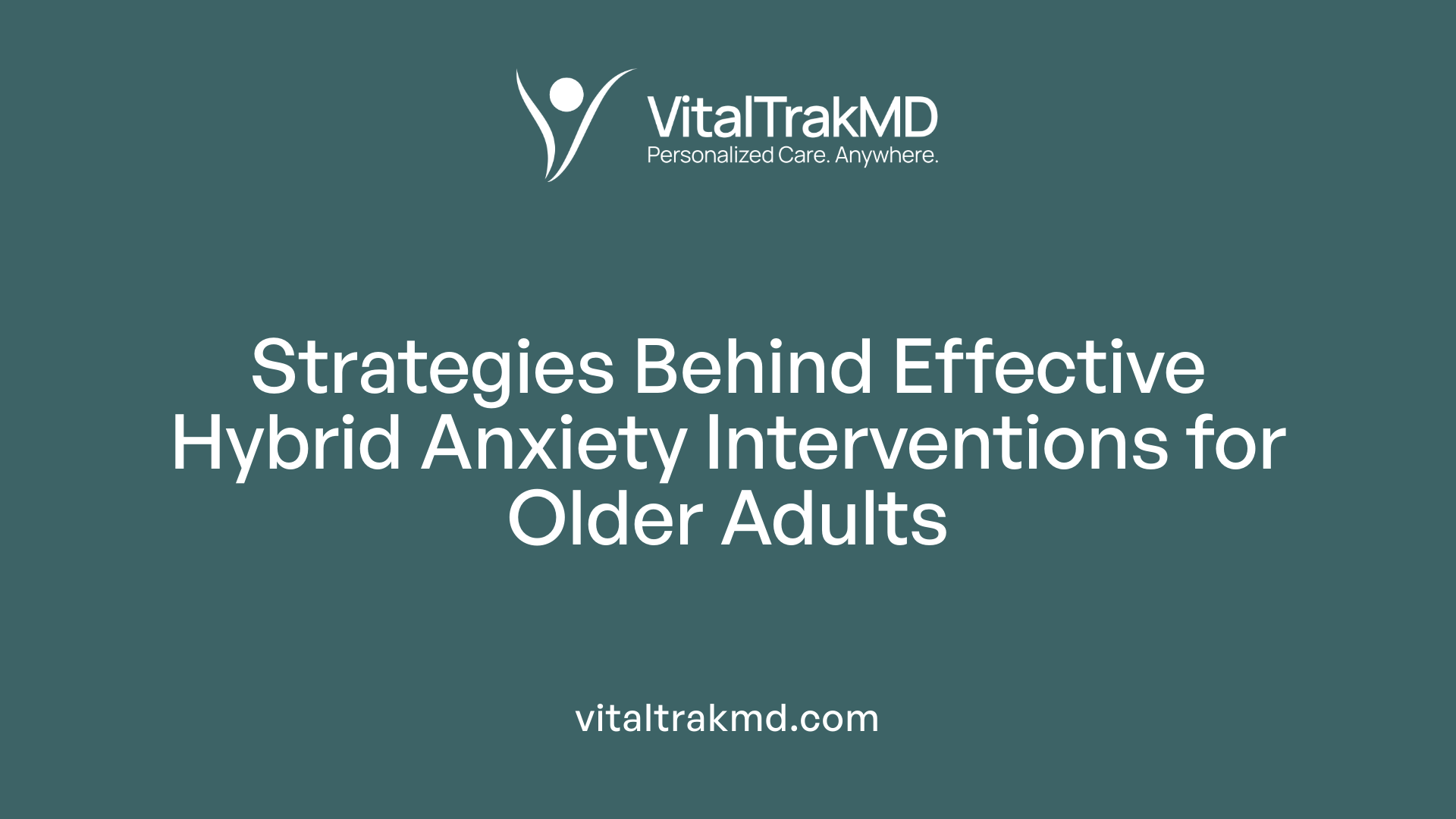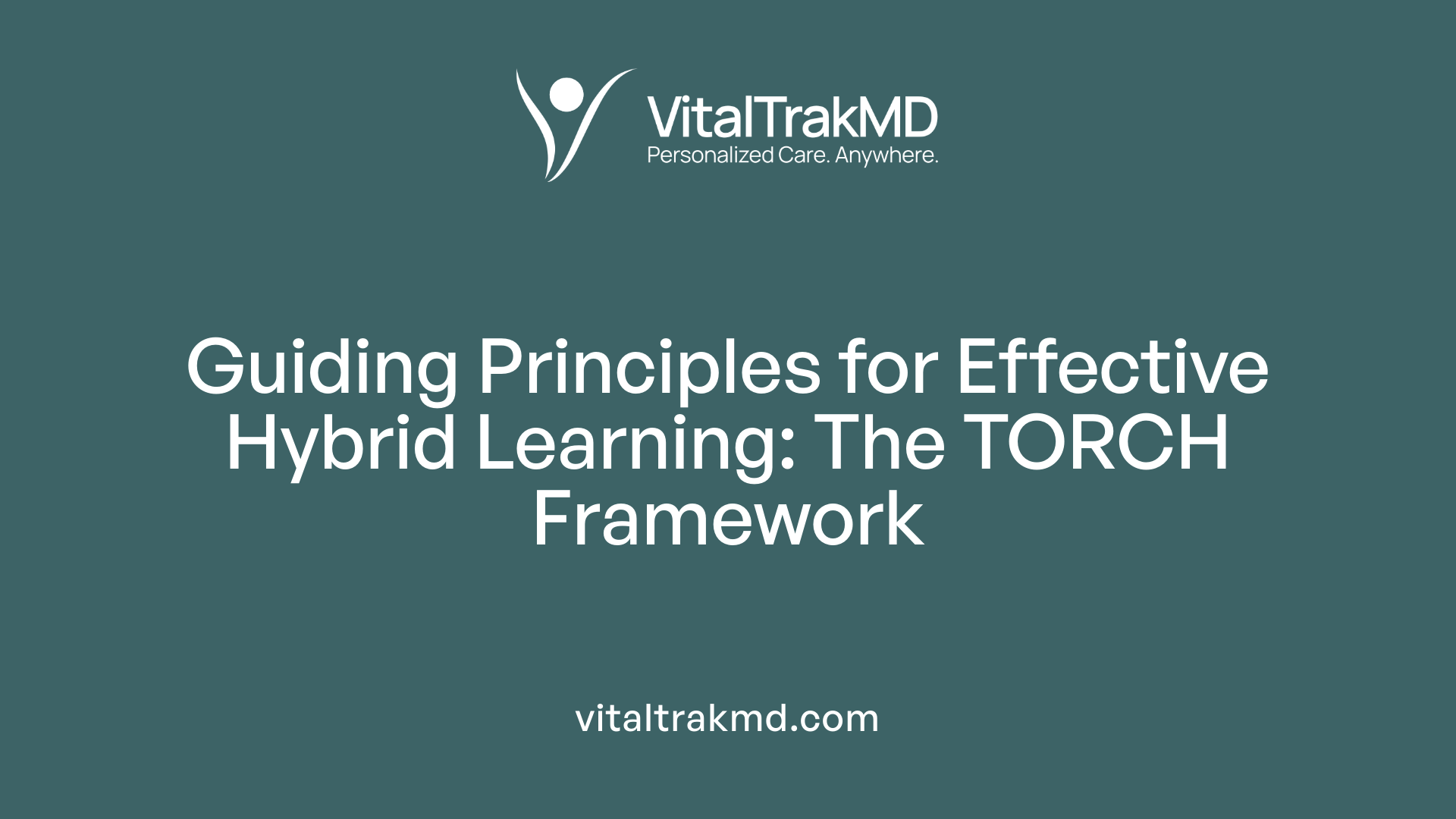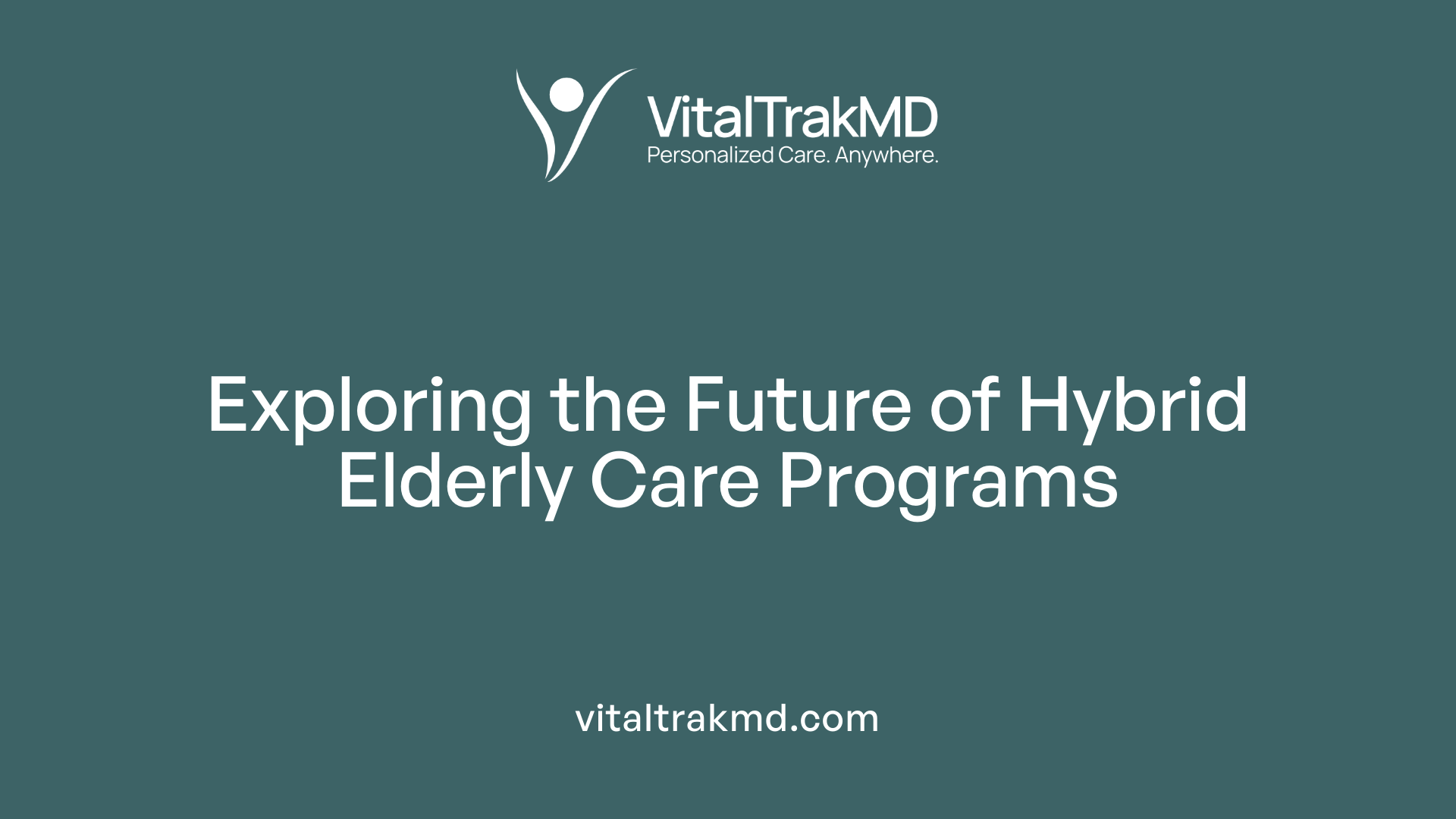How Hybrid Programs Reduce Health Anxiety in Older Adults

Understanding Hybrid Interventions for Older Adults
As populations age worldwide, addressing health anxiety among older adults has become a critical component of mental health care. Hybrid programs, which blend digital and face-to-face modalities, are emerging as effective strategies to reduce anxiety, improve mental health literacy, and foster social support. This article explores how these hybrid interventions are designed, implemented, and evaluated, highlighting their mechanisms, specific methods, and evidence of success.
The Concept of Hybrid Programs in Geriatric Mental Health
 Hybrid programs in mental health care combine both digital technology and traditional face-to-face interventions to provide comprehensive support for older adults.
Hybrid programs in mental health care combine both digital technology and traditional face-to-face interventions to provide comprehensive support for older adults.
These programs typically include components such as in-person psychoeducation sessions, like the 12-hour Older Person Mental Health First Aid (MHFA), and digital elements like online learning platforms or teleconferencing. For example, a recent community psychoeducation program integrated in-person workshops with online modules, allowing participants to access information flexibly.
The rationale for blending these approaches lies in their ability to enhance engagement and accessibility. Older adults often face barriers like mobility issues, stigma, or lack of digital literacy. Hybrid models address these challenges by providing on-site support alongside technological solutions, supporting continuous learning and social connection.
Supporting principles such as the TORCH framework—Technology provision, On-site support, Rehearsal, Connection, and Hardcopy notes—facilitate effective hybrid learning. They enable learners to comfortably navigate digital tools while maintaining personal interaction, which sustains motivation and reduces feelings of isolation.
Evidence from recent trials indicates that hybrid programs are as effective as in-person ones. Studies show improvements in depression literacy, reduced stigma, enhanced social support, and lower anxiety symptoms among older adults participating in hybrid models. Participants often appreciate the rich informational content, including case studies, interactive sessions, and tangible materials like printed handouts.
Overall, combining digital and face-to-face strategies offers a flexible, culturally sensitive approach to mental health education, meeting older adults’ diverse needs and preferences. This integrated approach is promising for expanding mental health support for aging populations, especially during times when in-person contact is limited or challenging.
| Aspect | Details | Additional Notes |
|---|---|---|
| Components | In-person sessions, teleconferencing, printed materials, interactive activities | e.g., MHFA, JoyAge briefing |
| Support Framework | TORCH principles | Focus on technology, support, connection |
| Effectiveness | Comparable to face-to-face programs | Reduces stigma, improves literacy |
| Participant Preferences | Informational content, case studies, interactive learning | Enhances engagement and learning |
| Benefits | Increased accessibility, reduced barriers, better social connection | Especially valuable for older adults |
More information on hybrid mental health programs for older adults can be found by searching for "Overview of hybrid mental health programs for older adults." Overall, hybrid programs offer a promising avenue to deliver effective, flexible mental health care tailored for aging populations.
Mechanisms and Strategies of Hybrid Interventions in Reducing Anxiety

How do hybrid interventions work to reduce anxiety?
Hybrid mental health programs combine structured, evidence-based components with flexible, adaptable strategies to address anxiety among older adults. These interventions are designed to modify negative thought patterns, alleviate emotional distress, and strengthen coping mechanisms.
What role does psychoeducation play?
Psychoeducation serves as the foundation by providing participants with knowledge about mental health issues such as depression and anxiety. For example, programs include sessions like the 12-hour Older Person Mental Health First Aid (MHFA) and service briefings that improve mental health literacy. Skilled delivery of content, including case studies and printed handouts, helps demystify mental health topics and reduce stigma.
How does behavioral activation contribute?
Behavioral activation encourages participants to engage in meaningful activities to combat feelings of loneliness and anxiety. For example, a hybrid board game called 'Journey of Memories' used reminiscence therapy to effectively lower anxiety scores and reduce loneliness, demonstrating how engaging activities foster positive emotional states.
In what ways does motivational interviewing enhance outcomes?
Motivational interviewing techniques are employed to motivate older adults to adopt healthier behaviors and seek help. By addressing ambivalence, these sessions improve health-seeking behaviors and self-management of chronic conditions, which indirectly reduce health-related anxiety.
How do hybrid programs address maladaptive thoughts?
Through cognitive restructuring within psychoeducational efforts, participants learn to identify and challenge negative beliefs, such as misconceptions about aging and mental health. Combining these approaches with social support and personalized content creates a supportive environment that mitigates maladaptive thoughts.
Strategies for effective implementation
Successful hybrid interventions require a balance between fidelity to core functions—like psychoeducation and behavioral strategies—and flexible adaptation to local contexts. The development of principles like TORCH (Technology, Rehearsal, Connection, and Hardcopy notes) supports this balance.
An emphasis on social and emergent mechanisms ensures that interventions remain relevant and acceptable. Integrating ethnographic and system-level analyses helps practitioners tailor their approach, fostering sustained improvements.
| Strategy Element | Description | Implementation Tip |
|---|---|---|
| Psychoeducation | Providing knowledge, case studies, and handouts | Use interactive and visual materials |
| Behavioral Activation | Engaging in meaningful activities to boost mood | Incorporate simple, enjoyable social games |
| Motivational Interviewing | Eliciting motivation for behavior change | Focus on empathetic listening and reframing |
| Addressing Maladaptive Thoughts | Cognitive restructuring to challenge negative beliefs | Use real-life examples and supportive dialogue |
| Flexibility within Core Components | Balancing standardization with local adaptation | Use principles like TORCH for guidance |
Overall, hybrid interventions leverage social, cognitive, and behavioral mechanisms, employing tailored strategies that respect individual and contextual differences. By doing so, they support older adults in managing anxiety effectively and sustainably.
Empirical Evidence Supporting Effectiveness of Hybrid Programs
Several studies underline the positive impact of hybrid mental health programs on older adults.
In a randomized controlled trial involving 38 seniors aged 61-75, participants engaged in a reminiscence therapy-based hybrid board game called 'Journey of Memories.' The experimental group completed three sessions with five-day intervals. Results showed significant decreases in anxiety, with scores on the State-Trait Anxiety Inventory (STAI) falling from 43.83 to 41.05 for state anxiety (p=0.000), and from 46.72 to 43.61 for trait anxiety (p=0.030). Additionally, loneliness, assessed via the UCLA Loneliness Scale, decreased from 39.11 to 36.11 (p=0.002).
Another study evaluated a comprehensive psychoeducation program combining in-person and telehealth sessions. The program included a 12-hour Older Person Mental Health First Aid (MHFA) course and a 3-hour JoyAge service briefing, aiming to improve mental health literacy and reduce stigma. Post-intervention findings showed improvements in depression literacy, reduced depression stigma, and enhancements in social support and meaning in life. These outcomes were measured using standardized assessment tools and demonstrated no significant differences between in-person and hybrid groups, indicating comparable effectiveness.
Participants valued interactive content, case studies, and hardcopy handouts, which enriched their learning experience. The study also introduced the TORCH principles—Technology provision, On-site technical support, Rehearsal, Connection with group members, and Hardcopy notes—to facilitate engagement and learning in hybrid settings.
The overall evidence suggests that hybrid programs effectively reduce anxiety and loneliness, improve mental health literacy, and are well-received by older adults. Combining digital tools with traditional face-to-face methods supports accessibility and maintains high engagement, making them a promising approach for mental health interventions in aging populations.
| Study Type | Participants | Main Intervention | Outcomes Measured | Significant Results |
|---|---|---|---|---|
| Randomized controlled trial | 38 elderly adults (61-75) | Hybrid board game 'Journey of Memories' | Anxiety (STAI), Loneliness | Significant reduction in anxiety and loneliness (p<0.01) |
| Psychoeducation program | 817 older adults (50+) | MHFA + JoyAge briefing (hybrid mode) | Depression literacy, stigma, social support | Improved outcomes; no difference between in-person and hybrid formats |
These findings underscore the practicality and benefits of hybrid mental health interventions, supporting their wider adoption in elder care.
Specific Hybrid Interventions for Addressing Health Anxiety
Hybrid interventions designed to reduce health anxiety often blend digital and in-person strategies, creating a multifaceted approach tailored to older adults. These programs typically include psychoeducation, reminiscence therapy, motivational interviewing, and the use of digital tools, each contributing uniquely to treatment.
Psychoeducation forms a core element, helping patients understand health concerns and distinguish between normal worry and maladaptive anxiety. By providing information through interactive sessions and hardcopy handouts, participants can better manage their fears and reduce stigma related to mental health.
Reminiscence therapy, although less common specifically for health anxiety, is used to improve emotional well-being. It encourages older adults to reflect on positive memories, fostering resilience and emotional stability. This approach can indirectly alleviate health-related worries by strengthening psychological resources.
Motivational interviewing (MI) is often integrated to enhance engagement and support behavior change. MI techniques help motivate participants to adopt healthier behaviors, adhere to treatment plans, and actively participate in therapy sessions, whether delivered face-to-face or via teleconferencing.
Digital tools and platforms play a vital role in supporting continuous care. Smartphone apps, virtual reality, and chatbots monitor symptoms, deliver reminders, and reinforce therapeutic strategies between sessions. These tools make interventions more accessible and adaptable to individual needs, especially for those with mobility or access limitations.
A comprehensive hybrid approach uses these components synergistically, providing education, emotional support, motivational enhancement, and technological assistance. This combination aims to not only reduce health anxiety but also empower individuals with the skills and resources needed to maintain mental well-being.
| Intervention Type | Description | Examples | Benefits |
|---|---|---|---|
| Psychoeducation | Informing about health concerns to reduce worry | Interactive sessions, handouts | Increased understanding, reduced stigma |
| Reminiscence Therapy | Reflecting on positive memories to improve emotional health | Guided memory sharing | Emotional resilience, stability |
| Motivational Interviewing | Enhancing motivation and engagement | One-on-one MI sessions | Higher adherence, sustained behavior change |
| Digital Tools | Using tech for monitoring and intervention reinforcement | Apps, chatbots | Accessibility, continuous support |
In sum, hybrid interventions combining these elements are proving effective, especially in addressing complex issues like health anxiety among older adults. They blend education, emotional support, motivation, and technology to create a holistic treatment experience.
Application of Digital and Face-to-Face Approaches
 Hybrid health care strategies that combine digital and face-to-face methods are increasingly important in supporting older adults. These approaches work together to increase access and engagement, making health services more convenient and tailored to individual needs.
Hybrid health care strategies that combine digital and face-to-face methods are increasingly important in supporting older adults. These approaches work together to increase access and engagement, making health services more convenient and tailored to individual needs.
Digital tools such as symptom-monitoring apps, telehealth consultations, and digital therapeutics allow for passive or real-time data collection. This enables health professionals to monitor conditions continuously and intervene promptly, providing personalized care that responds swiftly to changes in an older adult’s health or mental state.
At the same time, traditional face-to-face interactions offer vital emotional support, reassurance, and a sense of connection that digital methods sometimes lack. These in-person sessions are crucial for building trust, understanding specific needs, and delivering personalized care that considers the emotional and psychological well-being of older adults.
To enhance the effectiveness of hybrid models, some programs incorporate roles like digital navigators—trained staff members who assist older adults in using digital technologies. They help overcome barriers such as low digital literacy, ensuring sustained engagement and reducing potential frustration or drop-out rates.
This combined approach is adaptable to various health conditions, including mental health issues common among seniors. It allows health systems to customize the intensity of digital support and face-to-face contact based on individual preferences and clinical needs.
Overall, integrating digital tools with traditional care methods creates a more comprehensive, accessible, and responsive health care model. Such models improve both physical and emotional health outcomes for aging populations, leveraging technology to complement the human touch in health care delivery.
Incorporation of AI and Innovative Technologies in Hybrid Interventions
What role do machine learning, AI, or innovative technologies play in hybrid mental health interventions for the elderly?
Innovative technologies such as machine learning (ML), artificial intelligence (AI), and digital tools are increasingly integral to enhancing mental health services for older adults. These tools facilitate personalized care by analyzing psychological and sociodemographic data to predict mental health risks and stage classifications.
One prominent example is the use of AI models, including Support Vector Machines (SVM), Multilayer Perceptrons (MLP), and Random Forests (RF), which can classify and forecast levels of anxiety. Recent studies have demonstrated that RF models achieve high accuracy—up to 98.13%—in predicting anxiety severity across static stages, enabling timely interventions.
Predictive analytics harness machine learning algorithms to anticipate mental health crises, such as depression or heightened anxiety, often before symptoms become severe. This proactive approach is particularly beneficial for older adults, who may face barriers to consistent care.
Digital phenotyping is another innovative concept involving the collection of data from smartphones and wearable devices to monitor behavioral patterns, sleep, activity levels, and social interactions. These insights support personalized treatment adjustments and early detection of worsening symptoms.
Virtual Reality (VR) and Augmented Reality (AR) therapies create immersive environments for therapy or reminiscence activities, which can significantly reduce feelings of anxiety and loneliness. For example, VR-based reminiscence therapies enable older adults to engage with virtual environments that stimulate memories and foster social engagement.
Chatbots and virtual assistants provide scalable, on-demand mental health support by delivering psychoeducation, crisis management, and emotional assistance. These AI-driven tools can reduce stigma and increase access, especially for those hesitant to seek traditional in-person services.
While these technological innovations offer numerous benefits, they also pose challenges such as data privacy, digital literacy, and equitable access. Ensuring user-friendly interfaces and maintaining confidentiality are crucial for successful integration.
In sum, AI and related technologies support a more personalized, accessible, and scalable approach to mental health interventions for the elderly, complementing traditional care methods and expanding the reach of mental health services.
Below is a summary table of technological applications:
| Technology Type | Description | Impact |
|---|---|---|
| Machine Learning Models | SVM, MLP, RF used for classification of anxiety stages | Accurate prediction of mental health states |
| Predictive Analytics | Early detection of risks based on data trends | Preventive care and timely intervention |
| Digital Phenotyping | Data from smartphones/wearables to monitor behaviors | Personalized treatment adjustments |
| VR & AR Therapies | Immersive environments for reminiscence and therapy | Reduced loneliness and anxiety |
| Chatbots & Virtual Assistants | Automated support and psychoeducation | Increased engagement and access |
Overall, these technological enhancements are transforming how mental health care is delivered to older adults, making interventions more targeted, accessible, and effective.
Technological Principles Supporting Hybrid Interventions

What principles support older adults in hybrid learning modes?
To effectively facilitate hybrid psychoeducation programs for older adults, a set of guiding principles has been developed, known as the TORCH principles. These principles aim to address the unique challenges faced by older individuals when engaging with technology-based learning.
The first component, Technology provision, ensures that participants have access to necessary devices and reliable internet connectivity. This foundational support is vital for accessing online sessions and digital materials.
On-site technical support plays a crucial role by offering immediate assistance during digital sessions, helping resolve any technical difficulties that could hinder learning or cause frustration. This support builds confidence and reduces anxiety related to using unfamiliar technologies.
Rehearsal is encouraged through repeated practice sessions, which help older adults become more comfortable and proficient with digital tools, fostering independence in navigating hybrid learning environments.
Connection with group members emphasizes maintaining social bonds within learning groups, which enhances motivation and engagement while combating feelings of isolation. Facilitating social interaction helps develop a supportive learning community.
Hardcopy notes complement digital materials by providing tangible resources that participants can reference freely at their pace. These printed materials often include case studies, key concepts, and step-by-step instructions, reinforcing learning and compensating for any digital literacy gaps.
Together, these principles create a comprehensive framework, ensuring that older adults are well-supported in hybrid learning modes. This approach not only improves participation rates but also enhances overall learning outcomes by addressing technological, social, and educational needs, thereby making digital engagement accessible and effective for older populations.
For further insight, a detailed search on "TORCH principles for elderly hybrid education" offers extensive resources and practical guidelines for implementing these principles successfully.
The Future of Hybrid Programs in Elderly Care
 The growing evidence supporting hybrid psychoeducation and intervention models suggests a promising future for elder care. As the demand for accessible, effective mental health services increases among older populations, developing scalable and sustainable hybrid programs becomes essential.
The growing evidence supporting hybrid psychoeducation and intervention models suggests a promising future for elder care. As the demand for accessible, effective mental health services increases among older populations, developing scalable and sustainable hybrid programs becomes essential.
Expanding Reach and Scalability
To benefit more older adults, hybrid programs must adopt innovative delivery models. Integrating advanced technologies like artificial intelligence (AI) for predictive analytics can personalize interventions, making them more effective. Online platforms that offer flexible scheduling, interactive content, and easy-to-use interfaces can broaden access, especially for those in remote or underserved areas.
Training healthcare practitioners in digital health delivery is also crucial. Incorporating digital literacy training for staff ensures they can effectively manage hybrid sessions, maintaining quality of care.
Innovations on the Horizon
The future may see the integration of digital therapeutics tailored to individual needs, utilizing machine learning to adapt content dynamically. Virtual reality (VR) and augmented reality (AR) could provide immersive experiences that enhance engagement. Furthermore, wearable devices tracking physiological and psychological data can offer real-time monitoring, enabling prompt intervention.
Policy and Support Measures
Sustaining these advancements requires supportive policies. Investment in digital infrastructure, data privacy protections, and subsidies for internet access can reduce barriers. Funding models that incentivize hybrid service delivery can promote wider adoption.
Research and Development Directions
Ongoing research should focus on refining intervention protocols and establishing long-term benefits. Cost-effectiveness analyses will justify resource allocation. Additionally, studies exploring the integration of AI-based tools, such as predictive models for early diagnosis of depression or anxiety, are promising avenues.
Summary Table of Future Directions in Elder Care Programs
| Area | Focus / Innovation | Implementation Considerations | Expected Benefits |
|---|---|---|---|
| Scalability & Sustainability | Digital infrastructure, practitioner training | Policy support, funding, accessibility | Broader reach, sustainable care models |
| Technological Advances | AI, VR, wearable sensors | Data privacy, user-friendly design | Personalized, engaging, real-time monitoring |
| Policy & Support | Infrastructure investment, regulations | Stakeholder collaboration | Ensured access and data security |
| Research & Validations | Long-term outcomes, cost analyses, AI tools | Large-scale studies, diverse populations | Evidence-based policy-making, improved outcomes |
By embracing these directions, the future of hybrid programs in elder care can become more inclusive, innovative, and effective, ultimately improving mental health outcomes for older adults on a broader scale.
Summary and Future Perspectives on Hybrid Interventions
Hybrid programs represent a promising frontier in geriatric mental health care, combining technological innovation with personalized, face-to-face support to effectively reduce health anxiety. Evidence from empirical studies highlights their efficacy in improving mental health literacy, decreasing stigma, alleviating anxiety and loneliness, and promoting overall well-being. As technology advances, integrating AI, machine learning, and immersive digital tools will further enhance these interventions’ adaptability and scalability. Future efforts should focus on optimizing design, ensuring equitable access, and embedding robust evaluation frameworks to maximize impact. With continued research and policy support, hybrid programs hold the potential to transform mental health services for older adults worldwide, fostering healthier, more resilient aging populations.
References
- Hybrid-delivered community psychoeducation for people ...
- The Effect of a Reminiscence Therapy-Based Hybrid Board ...
- A hybrid mental health prediction model using Support ...
- Effects of a health-seeking behavior education program ...
- The views and experiences of older adults regarding digital ...
- design and methods for three linked randomised controlled ...
- Are 'hybrid' interventions inherently self-sabotaging? - PMC
Recent articles
Want to Feel Better and Live Healthier?
Join hundreds of patients taking control of their health with personalized care that fits their life – not the other way around.
Rated 4.8/5 by 32+ customers







